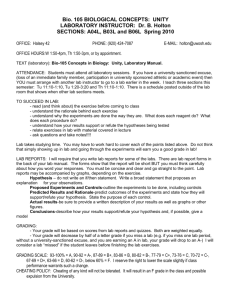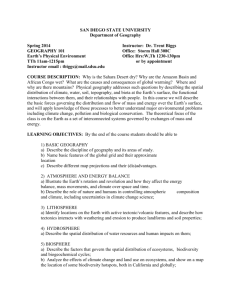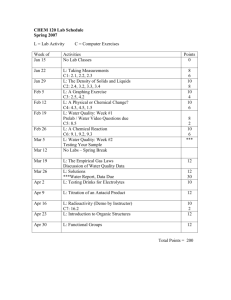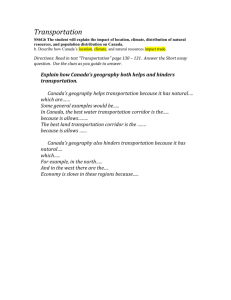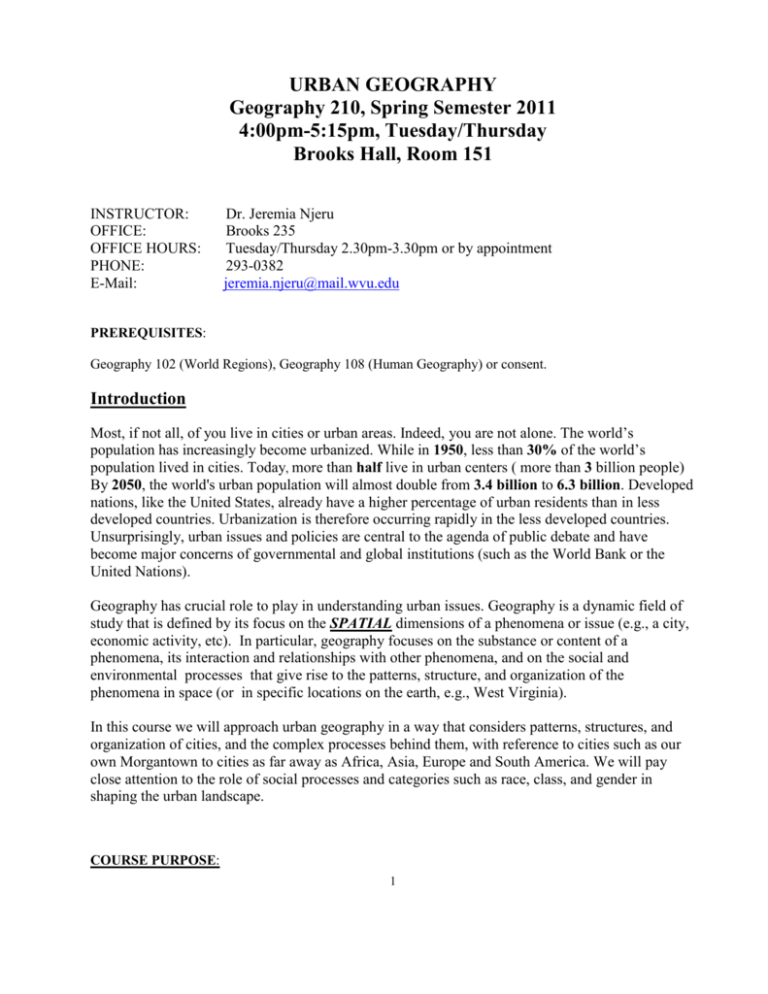
URBAN GEOGRAPHY
Geography 210, Spring Semester 2011
4:00pm-5:15pm, Tuesday/Thursday
Brooks Hall, Room 151
INSTRUCTOR:
OFFICE:
OFFICE HOURS:
PHONE:
E-Mail:
Dr. Jeremia Njeru
Brooks 235
Tuesday/Thursday 2.30pm-3.30pm or by appointment
293-0382
jeremia.njeru@mail.wvu.edu
PREREQUISITES:
Geography 102 (World Regions), Geography 108 (Human Geography) or consent.
Introduction
Most, if not all, of you live in cities or urban areas. Indeed, you are not alone. The world’s
population has increasingly become urbanized. While in 1950, less than 30% of the world’s
population lived in cities. Today, more than half live in urban centers ( more than 3 billion people)
By 2050, the world's urban population will almost double from 3.4 billion to 6.3 billion. Developed
nations, like the United States, already have a higher percentage of urban residents than in less
developed countries. Urbanization is therefore occurring rapidly in the less developed countries.
Unsurprisingly, urban issues and policies are central to the agenda of public debate and have
become major concerns of governmental and global institutions (such as the World Bank or the
United Nations).
Geography has crucial role to play in understanding urban issues. Geography is a dynamic field of
study that is defined by its focus on the SPATIAL dimensions of a phenomena or issue (e.g., a city,
economic activity, etc). In particular, geography focuses on the substance or content of a
phenomena, its interaction and relationships with other phenomena, and on the social and
environmental processes that give rise to the patterns, structure, and organization of the
phenomena in space (or in specific locations on the earth, e.g., West Virginia).
In this course we will approach urban geography in a way that considers patterns, structures, and
organization of cities, and the complex processes behind them, with reference to cities such as our
own Morgantown to cities as far away as Africa, Asia, Europe and South America. We will pay
close attention to the role of social processes and categories such as race, class, and gender in
shaping the urban landscape.
COURSE PURPOSE:
1
The goal of this course is for students to understand the processes that give rise to the spatial
organization of urban phenomena, and will generally involve gaining understanding of concepts
relating to the process of urbanization and its outcomes with greater emphasis on American
experiences.
LEARNING OUTCOMES
At the end of this course students will be expected to:
Understand the basic concepts and theories in the field of urban geography;
Have a better sense of the elements that constitute urban systems, and the social forces that
shape these systems;
Have a sense of the political, economic, and technological forces shaping the development
of urban systems, and an understanding of the social processes associated with creating
order and disorder in the urban environment;
Understand patterns and interactions within cities, and how they have evolved; and
Apply knowledge gained from this class to a variety of urban issues as outlined in the exams
and exercises.
REQUIRED TEXT
Urbanization: An Introduction to Urban Geography. Second edition.
Paul L. Knox and Linda McCarthy. Pearson / Prentice Hall. Upper Saddle River, NJ.
2005 (K & M).
Some more readings will be drawn from: Urban Geography, Second edition,
David Kaplan, James Wheeler, and Steven Holloway. John Wiley & Sons: Hoboken, NJ.
(These readings will be provided on E-campus at least a week before class)
NOTE: I will be using other materials to prepare my lectures and during class-including films,
video clips, website-links, etc. It is important therefore that you make every effort to attend all
classes.
INSTRUCTIONAL PROCEDURES:
Learning in this course includes in-class lectures, exercises, discussions, assigned readings in the
textbook, and other relevant material I may find in the course of the semester-such as news articles.
Lectures will contain a great deal of visual illustrations (videos, and Power-Point presentation).
Class participation, discussion and questions are strongly encouraged. The outline of lecture power
point slides will be available on e-campus.
2
STUDENT EVALUATION:
Question and Answer Activity
2 out-of-class exercises
3 video exercises
3 Quizzes
Mid-Term
Final Exam
Total
20%
6%
6%
13 %
23%
32%
100%
95 (5 points each)
30 (15 points each)
30 (10 points each)
60 (20 points each)
110
150
475
GRADING
A
B
C
D
F
90-100
80-89
70-79
60-69
59, and below.
Participation
You will be expected to attend all classes and engage in class discussions, and clearly demonstrate
your familiarity with assigned reading material.
Question and Answer Pairs (QAPs)
You will be required to bring to class one question generated from each class’ assigned readings
(about a concept, theme, issue covered in the readings). You will be given about 5 minutes to ask
your prepared question to one fellow student and in turn answer that student’s question. Your
question and your answer to someone else’s question should demonstrate your familiarity with the
readings. Each student will grade each other’s response on a scale of 1 to 5. Please BRING to
CLASS your TYPED question. Writing questions in the class will NOT be accepted. Each activity
will be worth 5 points allocated by me. NOTE: First QAP will be on Jan. 18 and last on April
19. None will be needed the days when exercises 1 and 2 are due.
Out-of-Class Exercise
We will have two out of class exercises. You will be told a week ahead of class which exercises it
will be. The exercises will be designed to help you link material covered in class to real-life urban
issues. Each exercise will be worth 15 points.
Video Exercises
We will watch 3 videos in class (excluding short you-tube video clips). To help you make sense of
the videos in the context of concepts or issues discussed in class, as you watch you will be required
to fill-in answers to questions prepared by me. I will be collecting your answers at the end of the
class. 10 points will be awarded for each exercise.
Quizzes
3
We will have 3 short quizzes of about 20 multiple-choice questions, 1 point per question. THERE
WILL BE NO MAKE-UPS FOR MISSED QUIZZES!!
Mid-Exam
This exam will consist of a mix of multiple choice and short answer questions, and will include the
material covered in class up to that point. MAKE-UP EXAMS will be given with a valid excuse
and will consist of ESSAYS.
Final Exam:
This exam will be more comprehensive, and will have a mix of multiple choice, shortanswer/definition, and essay questions. MAKE-UP EXAMS will be given with a valid excuse
and will consist of essays.
NOTE: Please bring your own pencil and a blue No. 30423 Scantron form the Final Exam. Also
Bring a Blue book.
WK
1
DATE
Jan. 11
Jan. 13
2
Jan. 18
Jan. 20
3
Jan. 25
COURSE SCHEDULE*
TOPIC
Introductions: Course outline, instructor, &
students
Introductions: What is urban geography?
READING
Chapter 1
The Origins and Growth of Cities: Explanations Chapter 2: Pg. 21-30
why Cities originated, Places where early Cities
began
The Origins and Growth of Cities: urban
Chapter 2: Pg. 31-51
expansion from regions of origin
Chapter 3: Pg. 53-65
The Foundations of the American Urban
System: emergence of US. Urban system from late
pre –independence to 1875
4
Jan. 27
4
Feb. 1
Feb. 3
5
Feb. 8
Feb. 10
6
Feb. 15
Feb. 17
7
Feb. 22
Feb, 24
8
Mar. 1
Mar. 3
9
Mar. 8
The Foundations of the American Urban
System: Urban system between 1875-1945;
concepts and explanations of urbanization process
(Quiz 1)
Globalization and the Urban Systems:
emergence of new inter-urban hierarchies
Globalization and the Urban Systems:
Interrelationships between world cities
Urban Form and Land Use: emergence of
internal structure (layout) of American Cities
(Class exercise 1)
Urban Form and Land Use: development of
American urban form at metropolitan level
Chapter 3:Pg. 65-77
Urban Social Landscapes: explanations of
American urban residential organization
Urban Social Landscapes: contemporary trends
in American urban residential organization
Exam Review
Mid-Term Exam
Urban Housing Market: Basics of Housing
Markets and Neighborhood Change
Chapter 12: Pg. 295318
Chapter 12: Pg. 318339
Urban Housing Market: Gatekeepers, Bias, and
Discrimination
Segregation, Race, Gender, and Urban Poverty:
Patterns of and cause of residential racial
segregation
Chapter 13: 358-375
Video # 1
Kaplan Reading:
On E-campus
5
Kaplan Reading: on Ecampus.
Kaplan Reading:
On E-campus.
Chapter 5: Pg.115-137
Chapter 6: Pg. 139169
Chapter 13: Pg. 341357
Mar. 10
10
Mar. 15
Mar. 17
11
Mar. 22, 24
Mar. 29
12
Mar. 31
13
Apr. 5
Apr. 7
14
Apr. 12, 14
15
Apr. 19
Apr. 21
16
Apr. 26
Segregation, Race, Gender, and Urban Poverty:
Explanations of urban Poverty and poverty
eradication efforts (Quiz 2)
Immigration, Ethnicity, Gender, and
Urbanism: Review of patterns of immigration
(Class Exercise 2)
Immigration, Ethnicity, Gender and
Urbanism: Impacts of the recent immigration
on cities
Spring Break
Urbanization in Less Developed Countries:
Urbanization trends and Origins
Impacts of over-urbanization developing
countries
Urban form and land use in less developed
countries: Morphology of Latin American cities
(Quiz 3)
Urban form and land use in less developed
countries: Morphology of a Sub-Saharan African
cities
Attend AAG/ Videos : shown in Class-Extra
Credits
Urban Policy and Planning: Development of
Modern Planning
Urban Policy and Planning: Contemporary
Planning
Class Conclusions
Chapter 15: Pg. 407425
Kaplan Reading
On E-campus
Kaplan Reading
On E-campus
Kaplan Reading
On E-campus
Video # 2
No Class
Chapter 7: Pg. 171195
Chapter 9: Pg. 225243
Chapter 8:Pg. 197-202
Chapter 8: Pg. 203-206
Chapter 17: Pg. 495514
Chapter 17: 514-523
Video # 3
Apr. 28
17
May. 6
Exam Review
Final Exam
8.00am-10.00am
*Note that this schedule is tentative and may change in the course of the
semester. I will make announcements when changes have been made. Please
6
assume responsibility to check your WVU Mix email account regularly.
Addition information for the course will be made available through WVU’s
website at https://ecampus.wvu.edu/. Log on to the course using your mix
username and login.
*Also be sure to check the schedule every week to make sure you know
which assignments and readings are required for which day.
OTHER IMPORTANT INFORMATION!!!
GEC OBJECTIVES MET BY THIS COURSE
Urban Geography is a 3 credit course which fulfills WVU General Education Curriculum Objective
4: Contemporary Society and Objective 7: American Culture.
DAYS OF SPECIAL CONCERN
WVU recognizes the diversity of its students and the needs of those who wish to be absent from
class to participate in Days of Special Concern, which are listed in the Schedule of Courses.
Students should notify me by the end of the second week of classes or prior to the first Day of
Special Concern, whichever is earlier, regarding Day of Special Concern observances that will
affect their attendance. Further, students must abide by the attendance policy of this class, as stated
on the syllabus. I will make reasonable accommodation for assignments that a student misses as a
result of observing a Day of Special Concern, so long as I am notified in advance as specified
above.
SOCIAL JUSTICE STATEMENT
West Virginia University is committed to social justice. I support that commitment and expect to
maintain a positive learning environment based upon open communication, mutual respect, and
non-discrimination. WVU does not discriminate on the basis of race, sex, age, disability, veteran
status, religion, sexual orientation, color or national origin. Any suggestions as to how to further
such a positive and open environment in this class will be appreciated and given serious
consideration.
If you are a person with a disability and anticipate needing any type of accommodation in order to
participate in this class, please advise me and make appropriate arrangements with Disability
Services (293-6700).
7
ACADEMIC INTEGRITY STATEMENT
The West Virginia University Undergraduate Catalog defines academic dishonesty in the following
ways:
Plagiarism: material that has been knowingly obtained or copied in whole or in part
(without acknowledgement) from the work of others.
Cheating: doing academic work for another student, or providing one’s own work for
another student to copy and submit as his/her own.
Because plagiarism and cheating violate the principle of academic integrity, clear
documentation that this has occurred will result in an F for this course.
8

